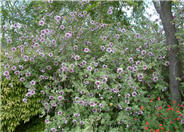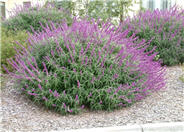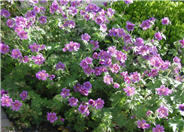
Common name:Jupiter's Beard, Red Valerian
Botanical name:Centranthus ruber
This perennial groundcover will grow 1-3' high and has medium-size blue/green leaves with red, pink, or white flowers that bloom in the summer. Very weedy near coast.

Common name:Mediterranean Tree Mallow
Botanical name:Lavatera maritima
This large, shrubby perennial grows up to 6' and has profuse lavender/pink flowers with maroon highlights. From the Mallow family, the flowers are produced year round and are especially showy in the fall.

Common name:Shrub Rose
Botanical name:Rosa Shrub varieties
The dark green, heavily veined leaves of this bushy rugosa are strong support for the pure white, nearly double flowers it produces. This is a very tolerant, heavily scented plant with an impressive fall color. Also, large hips appear intermittently with this plant.

Common name:Lily of the Nile
Botanical name:Agapanthus africanus
This evergreen groundcover/shrub will grow about 3' tall and has large green leaves with blue flowers ( there is a white variety) that bloom in spring and summer. It will grow in all soils but prefers loam soil.

Common name:Mexican Bush Sage
Botanical name:Salvia leucantha
The Mexican sage is a bushy shrub that grows 3-4 ft. tall and wide. It has hairy white stems, gray-green leaves and velvet like purple flower spikes that bloom summer through fall. This shrub tolerates sun, light shade, little water, and is hardy to 15 degrees F. The Mexican sage is drought tolerant and attracts hummingbirds. -Cornflower Farms

Common name:Jupiter's Beard, Red Valerian
Botanical name:Centranthus ruber
This perennial groundcover will grow 1-3' high and has medium-size blue/green leaves with red, pink, or white flowers that bloom in the summer. Very weedy near coast.

Common name:Geranium
Botanical name:Pelargonium X 'Magnificum'
Clouds of single lavender flowers are produced from spring through fall on this plant, which should be planted in areas that receive part sun. -Monterey Bay Nursery
| Designer: | Many Pathways |
Photographer: GardenSoft |
Soils and Compost:
Physical weed control, including mulching, or hand removal protects the watershed from harmful chemicals.
Water Saving Tip:
Check soil moisture below the surface with a soil probe or large screwdriver, trowel or shovel. Don't assume the plants need water just because the soil surface looks dry.
Integrated Pest Management:
Drip and other smart irrigation delivers water directly to roots, allowing no excess water for weeds.

